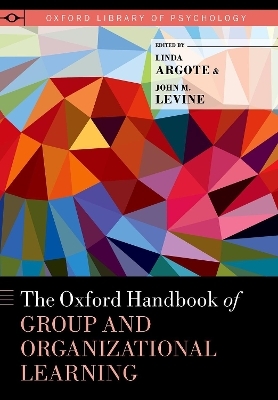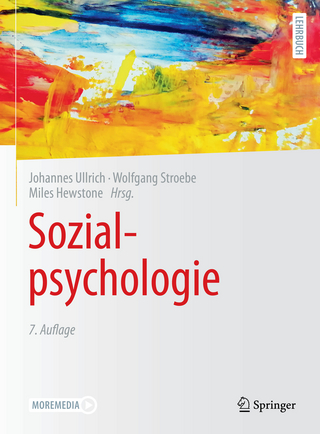
The Oxford Handbook of Group and Organizational Learning
Oxford University Press Inc (Verlag)
978-0-19-026336-2 (ISBN)
The goal of this handbook is to bring together cutting-edge theoretical and empirical work on group and organizational learning by leading scholars from several disciplines. Because many of the same processes influence learning in groups and organizations, including both kinds of learning in the same volume has the potential to facilitate the integration of knowledge and the cross-fertilization of ideas. These benefits are reciprocal, in that research at the group level can shed light on how organizations learn whereas research at the organizational level can illuminate how groups learn. By clarifying similarities and differences in the processes that underlie learning in groups and organizations, the handbook advances understanding of the causes and consequences of learning in collectives of varying size and complexity.
Linda Argote is the David M. and Barbara A. Kirr Professor of Organizational Behavior and Theory in the Tepper School of Business at Carnegie Mellon University, where she directs the Center for Organizational Learning, Innovation and Knowledge. Her research focuses on organizational learning, knowledge transfer, transactive memory, and group processes and performance. Her book, Organizational Learning: Creating, Retaining and Transferring Knowledge was a finalist for the Terry Book Award of the Academy of Management. Dr. Argote served as Editor-in-Chief of Organization Science and Departmental Editor of Management Science. She was chosen as Distinguished Scholar by the Organization and Management Theory division of the Academy of Management. The International Network for Groups Research recognized her with the Joseph E. McGrath Award for Lifetime Achievement in the Study of Groups. She is a Fellow of the Academy of Management, the Association for Psychological Science, and the Institute for Operations Research and Management Sciences. John M. Levine is Professor of Psychology and Senior Scientist, Learning Research and Development Center, at the University of Pittsburgh. His research focuses on small group processes, including newcomer innovation in work teams, reaction to deviance and disloyalty, and the impact of disagreement/argumentation on learning. He has served as Editor of the Journal of Experimental Social Psychology and Chair of the Society of Experimental Social Psychology. Dr. Levine was co-recipient of the Joseph E. McGrath Award for Lifetime Achievement in the Study of Groups from the Interdisciplinary Network for Group Research and received an Honorary Doctorate from the University of Lausanne, Switzerland. He is currently an Honorary Professor of Psychology at the University of Kent, Canterbury, UK.
PART I. Introduction
1. John M. Levine and Linda Argote, Group and Organizational Learning: Past, Present, and Future
2. Psychological Foundations of Group and Organizational Learning
Zur Shapira
PART II. Processes of Group and Organizational Learning
Mindfulness of Learning Processes
3. Deliberate Learning
Michael A. Lapré and Ingrid M. Nembhard
4. Organizational Learning and Organizational Improvisation
Anne S. Miner and Jay O'Toole
Information Sampling and Search
5. Attention, Knowledge, and Organizational Learning
William Ocasio, Luke Rhee, and Daniel Milner
6. Sampling Biases Explain Decision Biases
Jerker Denrell
7. Organizational Learning From Failure: Present Theory and Future Inquiries
Vinit M. Desai, David Maslach, and Peter M. Madsen
Information Processing and Interpretation
8. Information Sharing Within Groups in Organizations: Situational and Motivational Influences
James R. Larson, Jr. and Amanda C. Egan
9. Learning While Deciding in Groups
R. Scott Tindale and Jeremy R. Winget
10. Team Reflexivity
Michaéla C. Schippers, Amy C. Edmondson, and Michael A. West
11. Advancing Team Learning: Process Mechanisms, Knowledge Outcomes, and Implications
Steve W. J. Kozlowski and Bradford S. Bell
Training
12. Team Training in Organizations: It Works-When Done Right
Eduardo Salas, Denise L. Reyes, and Amanda L. Woods
13. Team Training in the Organizational Context
Norbert K. Semmer and Franziska Tschan
Remembering and Retaining Knowledge
14. How Interacting Groups Remember: Implications for Learning by Groups in Organizations
Verlin B. Hinsz, Kevin R. Betts, Miriam Sánchez-Manzanares, and R. Scott Tindale
15. Is Organizational Memory a Useful Capability?: An Analysis of Its Effects on Productivity, Absorptive Capacity, and Adaptation
Amit Jain
Performance Feedback and Social Comparisons
16. Performance Feedback in Organizations and Groups: Common Themes
Henrich R. Greve and Vibha Gaba
17. Social Comparison and Learning From Others
Christine M. Beckman and Hyeun J. Lee
Learning from Others and Transferring Knowledge
18. Personnel Movement as a Mechanism for Learning in Organizations and Teams
Aimée A. Kane and Floor Rink
19. Knowledge Transfer: Barriers, Methods, and Timing of Methods
Gabriel Szulanski and Sunkee Lee
Innovation and Creating Knowledge
20. Group and Intergroup Creativity
Paul B. Paulus and Jared B. Kenworthy
21. Team Innovation Cycles
Martine R. Haas and Jonathon N. Cummings
22. Collective Paradoxical Frames: Managing Tensions in Learning and Innovation
Ella Miron-Spektor and Susannah B. F. Paletz
PART III. Contextual Influences on Group and Organizational Learning
Unit Composition
23. Team Emotions and Team Learning
Dorthe Døjbak Håkonsson, Panagiotis Mitkidis, and Sebastian Wallot
24. Team Diversity and Learning in Organizations
Daan van Knippenberg and Julija N. Mell
25. Collective Intelligence and Group Learning
Anita Williams Woolley and Ishani Aggarwal
Structures and Routines
26. Organizational Routines and Organizational Learning
Markus C. Becker
27. Organizational Structure and Organizational Learning
Phanish Puranam and Boris Maciejovsky
28. How and When Can Social Hierarchy Promote Learning in Groups?
J. Stuart Bunderson and Bret Sanner
29. Learning in Chains and What We Can Learn From It
Anne Marie Knott
Intergroup Contexts
30. A Social Identity Model for Education
Dominic Abrams, Diane M. Houston, Barbara M. Masser, and Blake M. McKimmie
31. Learning Who We Are From Our Leaders: How Leaders Shape Group and Organizational Norms and Identities
Michael A. Hogg
32. Organizational Learning and Multiteam Systems
Leslie A. DeChurch, Gina M. Bufton, Sophie A. Kay, Chelsea V. Velez, and Noshir S. Contractor
Online Environments
33. Learning in Virtual Teams
Yuqing Ren
34. Theorizing Knowledge Collaboration in Online Communities
Ann Majchrzak, Sirkka L. Jarvenpaa, and Samer Faraj
| Erscheinungsdatum | 03.01.2020 |
|---|---|
| Reihe/Serie | Oxford Library of Psychology |
| Verlagsort | New York |
| Sprache | englisch |
| Maße | 191 x 257 mm |
| Gewicht | 1429 g |
| Themenwelt | Geisteswissenschaften ► Psychologie ► Arbeits- und Organisationspsychologie |
| Wirtschaft ► Betriebswirtschaft / Management ► Planung / Organisation | |
| ISBN-10 | 0-19-026336-9 / 0190263369 |
| ISBN-13 | 978-0-19-026336-2 / 9780190263362 |
| Zustand | Neuware |
| Haben Sie eine Frage zum Produkt? |
aus dem Bereich


